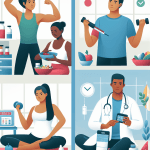This article is for informational purposes only and is not a substitute for professional medical advice. Always consult your healthcare provider for personal recommendations.
Understanding High Blood Pressure
High blood pressure, or hypertension, is often referred to as the “silent killer” because it typically presents no symptoms. According to the CDC, it affects nearly half of adults in the United States. But what does it mean for your health, and how can you lower it effectively? Understanding the underlying mechanisms of hypertension can help you take proactive steps toward better health.
What Causes High Blood Pressure?
Several factors contribute to high blood pressure, including genetics, diet, physical inactivity, and stress. For instance, consuming a diet high in salt can lead to fluid retention, which increases blood pressure. Similarly, a sedentary lifestyle can weaken the heart, making it work harder to pump blood. Hormonal imbalances, particularly those involving the renin-angiotensin system, can cause blood vessels to constrict, further elevating blood pressure.
Moreover, conditions such as obesity, diabetes, and sleep apnea can exacerbate hypertension. In fact, the pathophysiology of hypertension often involves a complex interplay of genetic predisposition and environmental factors. For example, the sympathetic nervous system may become overactive, leading to increased heart rate and vascular resistance. Understanding these mechanisms is crucial in managing and preventing hypertension effectively.
Effective Treatments for High Blood Pressure
Managing high blood pressure often requires a combination of lifestyle changes and, in some cases, medication. Understanding these options can empower you to take control of your health.
Medications
For many, medication is necessary to manage hypertension. Common classes of blood pressure medications include:
- Diuretics: Help the body eliminate excess sodium and water, reducing blood volume.
- ACE Inhibitors: Relax blood vessels by blocking the formation of a hormone that narrows them.
- Beta-Blockers: Decrease heart rate and the heart’s workload.
- Calcium Channel Blockers: Prevent calcium from entering heart and blood vessel cells, relaxing blood vessels.
Consulting with a healthcare provider is essential to determine the best medication for your situation, as side effects can vary. It’s important to remember that while medications can effectively lower blood pressure, they are most effective when combined with lifestyle changes.
Natural Ways to Lower Blood Pressure
In addition to medications, numerous natural strategies can help lower blood pressure effectively:
1. Dietary Changes
Adopting a DASH diet (Dietary Approaches to Stop Hypertension) can significantly lower blood pressure. This diet emphasizes:
- Fruits and vegetables
- Whole grains
- Lean proteins
- Low-fat dairy
- Reduced sodium intake
Research shows that individuals following the DASH diet can lower their blood pressure by 8-14 mmHg within weeks (PubMed). Incorporating potassium-rich foods, like bananas and spinach, can also help balance sodium levels and promote healthy blood pressure.
Additionally, consider reducing processed foods, which often contain hidden sodium and unhealthy fats. Cooking at home using fresh ingredients can be a game-changer for both your health and your taste buds.
2. Regular Exercise
Engaging in regular physical activity, such as brisk walking, cycling, or swimming, can lower blood pressure by about 5-8 mmHg. Aim for at least 150 minutes of moderate aerobic exercise each week. Even short bursts of activity can be beneficial. For example, a 30-minute walk five times a week can make a significant difference in your overall cardiovascular health.
Strength training exercises, performed at least twice a week, can also help improve blood pressure levels. Consider incorporating resistance bands or weights into your routine for added benefits.
3. Stress Management
Chronic stress can contribute to hypertension. Techniques such as yoga, meditation, and deep breathing exercises can effectively reduce stress levels. For instance, practicing mindfulness meditation for just 10 minutes a day can help lower blood pressure over time. Consider integrating stress-reducing activities into your daily routine, such as taking short breaks during work or engaging in hobbies you enjoy.
Additionally, keeping a journal to express your thoughts and feelings can provide an emotional outlet and help you manage stress better.
4. Limit Alcohol and Quit Smoking
Excessive alcohol consumption can raise blood pressure, while smoking harms blood vessels. Reducing alcohol intake to moderate levels and quitting smoking can lead to significant improvements in blood pressure. The CDC recommends limiting alcohol to no more than one drink per day for women and two drinks per day for men.
Quitting smoking not only improves blood pressure but also enhances overall cardiovascular health. If you’re struggling to quit, consider seeking support from healthcare providers or local cessation programs.
5. Maintain a Healthy Weight
Being overweight increases the risk of hypertension. Losing even a small amount of weight (5-10% of your body weight) can help lower blood pressure. Combining a healthy diet with regular exercise is the most effective approach. Consider setting achievable weight loss goals and tracking your progress to stay motivated.
Using a food diary or an app can help you become more aware of your eating habits and identify areas for improvement.
Monitoring Your Blood Pressure
Regularly monitoring your blood pressure is crucial for managing hypertension. Home blood pressure monitors are widely available and can help you track your progress. Aim to check your blood pressure at the same time each day for consistency. Keeping a log of your readings can provide valuable information for your healthcare provider.
It’s also important to ensure that you are using the monitor correctly. Follow the manufacturer’s instructions, and consider having your device calibrated at your doctor’s office periodically to ensure accuracy.
Patient Vignette
Consider Sarah, a 45-year-old teacher who struggled with high blood pressure for years. After consulting her doctor, she started the DASH diet and incorporated 30 minutes of brisk walking into her daily routine. She also practiced mindfulness meditation to manage her stress. Within three months, her blood pressure dropped from 145/95 mmHg to 128/82 mmHg. She felt more energetic and confident, proving that lifestyle changes can have a profound impact on health. Sarah’s experience illustrates the importance of a holistic approach to managing hypertension.
Myth vs. Fact
Myth: High blood pressure only affects older adults.
Fact: Hypertension can affect individuals of all ages, including young adults and children.
Myth: You can feel high blood pressure.
Fact: Most people with high blood pressure do not experience symptoms, which is why regular monitoring is essential.
Myth: Medication is the only way to lower blood pressure.
Fact: While medications can be effective, lifestyle changes play a crucial role in managing blood pressure.
Myth: Reducing salt is the only dietary change needed.
Fact: While reducing sodium intake is critical, focusing on overall dietary quality, including increasing potassium-rich foods, is equally important.
Frequently Asked Questions
What is considered high blood pressure?
High blood pressure is generally defined as having a reading of 130/80 mmHg or higher, according to the American Heart Association.
How quickly can lifestyle changes lower blood pressure?
Many individuals can see significant improvements within a few weeks of adopting healthier habits, such as diet and exercise.
Can I manage high blood pressure without medication?
In some cases, lifestyle changes alone can effectively manage high blood pressure. However, it’s essential to consult with a healthcare provider for personalized advice.
Is salt the only dietary factor to consider?
While reducing sodium intake is critical, it’s also important to focus on overall dietary quality, including increasing potassium-rich foods like bananas and spinach.
How often should I monitor my blood pressure?
If you have high blood pressure, aim to monitor it at least once a day or as directed by your healthcare provider.
Key Takeaways
- High blood pressure is a common condition that can lead to serious health issues.
- Effective management often requires a combination of medication and lifestyle changes.
- Natural strategies like diet and exercise can significantly lower blood pressure.
- Regular monitoring is essential for tracking progress and making necessary adjustments.
- Consulting with a healthcare provider ensures a tailored approach to managing hypertension.
Key Takeaways
- High blood pressure is a common yet serious health issue.
- Lifestyle changes can significantly impact blood pressure levels.
- The DASH diet is effective for lowering hypertension.
- Regular exercise and weight management are crucial.
- Monitoring blood pressure regularly helps track progress.
References
- CDC: Facts About Hypertension
- American Heart Association: High Blood Pressure
- PubMed: Dietary Approaches to Stop Hypertension
- NHS: High Blood Pressure
- UpToDate: Management of Hypertension
- WHO: Hypertension Fact Sheet
- Mayo Clinic: High Blood Pressure Treatment Options
- Harvard Health: Lifestyle Changes to Lower Blood Pressure








Post a comment